Covid-19 Australia: Victoria records 1007 cases, 12 deaths; NSW has 262 cases, three deaths
Victorians are set to celebrate a raft of new freedoms from this weekend, despite the state recording another day of more than 1000 cases and 12 deaths.
Coronavirus
Don't miss out on the headlines from Coronavirus. Followed categories will be added to My News.
The vast majority of Victoria’s Covid rules will be scrapped from Thursday night, as the state prepares to hit its 90 per cent full vaccinated target.
Premier Daniel Andrews made the announcement on Thursday, revealing the host of changes which will see “almost all” restrictions end.
“First and foremost, there are no more caps, there are no more rules in terms of how many people can be in different spaces,” he said.
“All of these things, which we’ve missed and which are absolutely about getting that normality that we’ve all craved.”
Density limits will be scrapped for hospitality, concerts and events with double-dosed attendees.
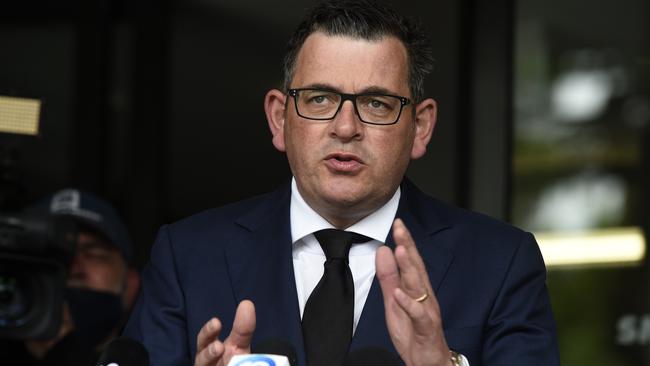
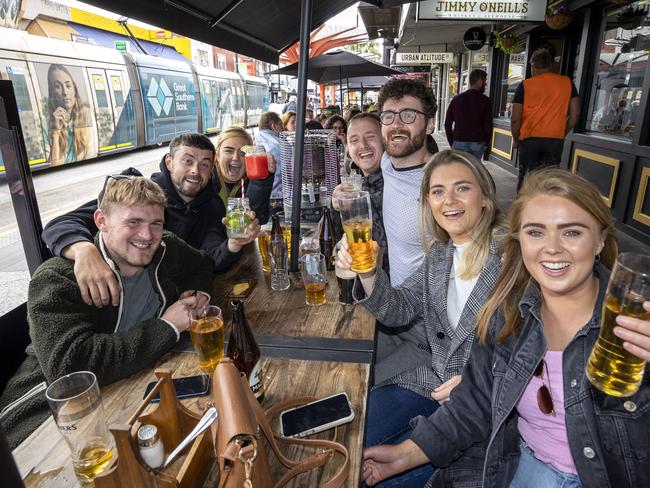
Indoor dance floors are set to be legal for the first time in six months — including at both weddings and nightclubs.
There will be no cap on the number of visitors Victorians can have at their homes.
Big changes are also coming to the state’s isolation requirements with fully-vaccinated contacts.
From midnight, those who come into contact with a positive case will be required to get a PCR test and isolate only until they get a negative result.
Weddings and funerals can also go ahead without density limits for fully vaccinated people.
Vaccination requirements will remain for non-essential retail, events and hospitality across the state, and large events must have an approved Covid-safe plan.
Masks will also remain mandatory in retail settings for at least another month along with other high risk settings inlcuding public transport and healthcare settings.
An encouraged return to the office is on the agenda for fully vaccinated Victorian office workers.
More than 88 per cent of eligible Victorians are now fully vaccinated, with almost 93 per cent having received at least one dose.
It comes as Victoria has recorded 1007 new cases and 12 Covid deaths in the past 24 hours.
There are now 337 Victorians in hospital with coronavirus with 63 in ICU and 34 needing a ventilator.
A total of 72,270 tests were recorded in the past 24 hours.
There are 13,814 active cases across the state.
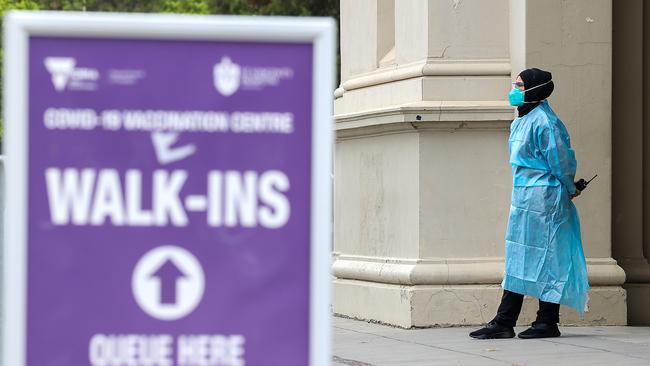
NSW recorded 262 new cases as the state approaches 95 per cent first-dose vaccination coverage.
Second Covid booster jab will be needed, experts say
A second Covid vaccine booster jab could be needed within the next few years, according to experts with immunity against the virus estimated to drop below 50 per cent in the six months after a second dose.
Federal Health Department data shows that 284,000 people aged over 16 have received the booster in Australia, which is just under half the 577,000 people currently eligible for the shot. Around 1.6 million people in Australia will be eligible for a booster dose in December.
In a report published in the Lancet, researchers from the Kirby Institute, the Doherty Institute and the University of Sydney found that a third, booster jab within a year more than doubled levels of immunity than that seen after the first two doses.
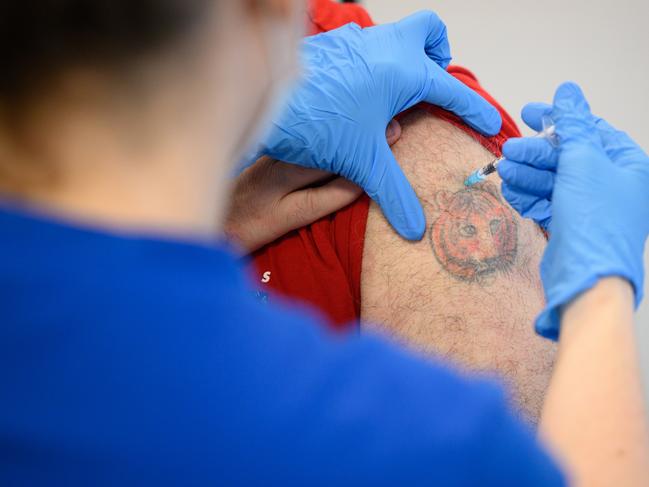
The research also showed that boosters work at improving immunity against current variants, including Delta.
Professor Jamie Triccas, from the University of Sydney, who co-authored the report, told Nine research showed a booster dose was effective, “but it is very unlikely a third dose will protect us for life”.
Dr Deborah Cromer, a senior research fellow at Sydney’s Kirby Institute and another co-author on the paper, said boosters would be crucial in the fight against COVID-19.
“A major implication of our research is that to keep up immune protection booster shots are needed,” she told Nine.
“Reassuringly though, protection against severe disease and death will likely remain high beyond the first year.
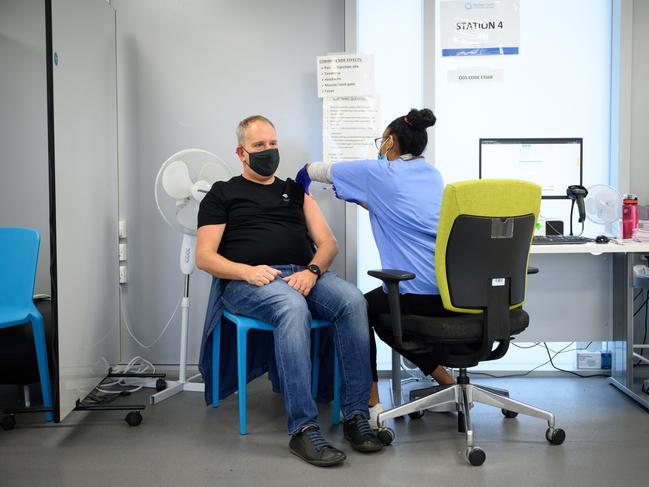
“We don’t know what variants will emerge in the next couple of years, and what vaccines will be needed. The virus has continued to surprise us. But without boosters, protection from symptomatic COVID-19 could drop below 50 per cent after six months, which means more people will become infected.”
Dr Cromer said twhile vaccines have been incredibly effective, their effectiveness a year after two doses may have fallen to about 40 per cent “and will drop further after the next year”.
“Beyond that year it will keep dropping and dropping,” she said. “We will likely need a fourth dose but not for a lot longer. So, I wouldn’t be surprised if we find that it is significantly longer than the six months that was needed for the third dose before we need another one.”
NT HEALTH SYSTEM ‘WOULDN’T COPE’ WITH OUTBREAK
The Northern Territory’s health system would be unable to cope with a widespread community outbreak of Covid-19, a top official has warned.
As the Territory’s coronavirus cluster hit 19 on Wednesday, NT deputy chief health officer Dr Charles Pain told The Australian that the system “is prone to being overwhelmed if we cannot get people protected”.
He further warned that vaccination rates in some areas were dangerously low.
“The modelling we have seen, if we have a widespread outbreak in the community, we cannot manage that,” he said. “That is a significant risk we are very concerned about.”
Dr Pain’s was one of several grim warnings about the NT’s cluster and vulnerability.
Katherine mayor Elisabeth Clark said the area’s outbreak “has the potential to wipe out a lot of people”.
“I’m concerned it has the potential (to be deadly),” she told the NT News.
Ms Clark said the cluster was expected to grow as testing results returned.
“There will be others, there’s no doubt,” she said.
Chief Minister Michael Gunner described the situation was a “serious” demonstration of how quickly the Delta variant could spread into the community.
THREE-WEEK-OLD BABY GIRL INFECTED
A three-week-old baby girl is one of the six new infections recorded in the Northern Territory on Wednesday as its worst Covid-19 outbreak has again grown.
Chief Minister Michael Gunner — who described the situation as “serious” — said all new infections presented in Indigenous Australians and were close contacts of other cases.
Five were from the remote community of Robinson River, including a 13-year-old girl and the baby, while the other was a 36-year-old man from Katherine.
Mr Gunner said he feared people would die from Covid-19 in the NT and urged residents who hand-wrote check-ins to keep their writing legible and correctly fill out information because the Top End’s health team was “behind the eight-ball” trying to locate people who visited exposure sites.
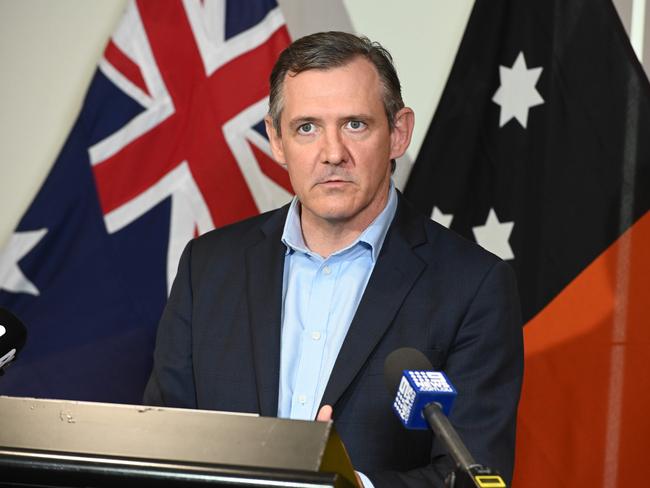
“Please, please don't let it be your life. The vaccine is your best defence with ample supply across the Territory,” he said.
“Instead of using our time to get in contact with close contacts and organising testing, contact tracers have to use that time to go through CCTV to identify everyone.
“We know how quickly Delta can spread within households, and we cannot be sure yet that it has not spread further into the Robinson River and Katherine communities, or wider in the Territory.”
New testing requirements are now in place for everyone who attended Robinson River since November 11 and Katherine since November 7, regardless if they have symptoms or not.
They must isolate until a negative result is received.
The cluster has now reached a total of 19 cases.
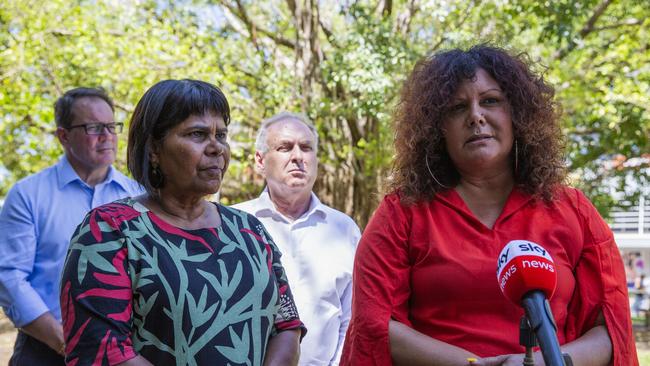
It comes as the Labor senator at the centre of the outbreak confirmed nine of her relatives tested positive the virus on Tuesday, two of them five-year-old twins.
The Covid-19 outbreak in remote Indigenous communities in the Northern Territory is “our worst fears realised”, Labor senator Malarndirri McCarthy said, with more urgent action required to keep First Nations people safe.
Her call came just as Health Minister Greg Hunt enacted a ban on people entering and leaving Robinson River and surrounding homelands in a bid to stop further Covid-19 spread.
PASSENGERS TOLD TO ISOLATE
Western Australian travellers who arrived from Tasmania on Sunday have been asked to self-isolate for two weeks after a man travelled to Hobart Airport while awaiting a Covid test result.
There were 67 travellers on board the Qantas flight QF1017, which landed in Perth at 5.35pm.
Tasmanian health authorities declared Hobart Airport an infection site, after the man travelled from Brisbane to Tasmania on November 14 and was notified of his positive test while in the airport terminal.
The new positive case was a Victorian man who was refused entry to Queensland because of insufficient paperwork.
He was tested and placed into hotel quarantine, but was allowed to board a flight to Melbourne – via Hobart – the following day.
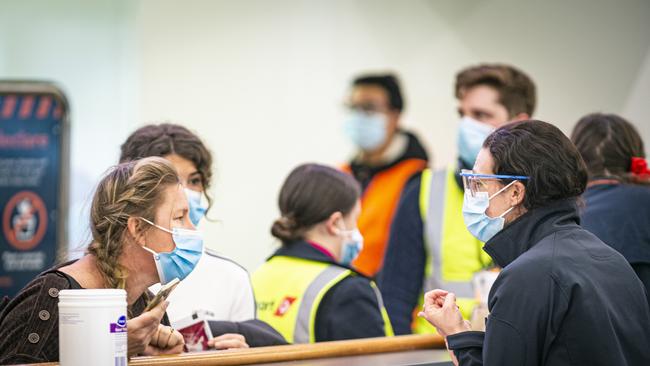
However, 250 people have now been identified as having come into contact with the positive case.
About 100 of the contacts were on the same flight as the man, while a further 125 were exposed to the virus while in the terminal – including 17 biosecurity officers, four health screening staff and two police officers.
“People who have recently returned from Tasmania should monitor symptoms and if they feel unwell, get tested and quarantine,” a WA health department release reads.
“Anyone who has been to an exposure location listed on the Tasmania website should quarantine until they have been advised otherwise by Public Health.”
Tasmania currently has no community transmission of the virus, with plans to reopen to Covid states in mid-December, once 90 per cent of the population over 12 is fully vaccinated.
THOUSANDS OF AUSSIES FILE COVID INJURY CLAIMS
More than 10,000 Australians left with rare but serious reactions from the Covid-19 vaccine, are planning to file a claim under the government’s no-fault indemnity scheme.
According to Nine, an online portal will be launched next month by Services Australia for uncapped claims above $5000 from those who have suffered injury and loss of income due to the Covid-19 vaccine.
The compensation for medical costs and lost wages would be paid by the government if successful.
More than 10,000 Australians have already registered their interest to make a claim, after registrations opened in September on the federal health department’s website.
It’s estimated at least $50 million will be spent by the government if each claim is approved.
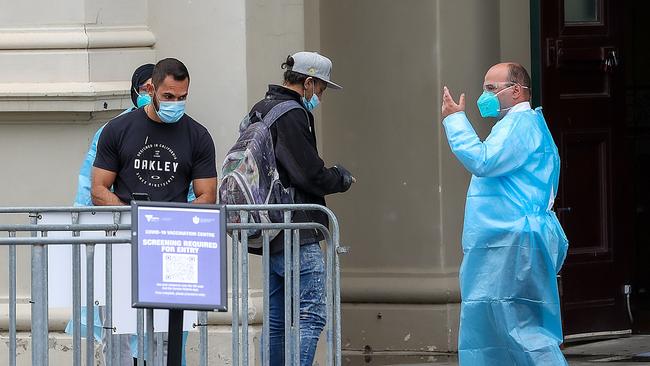
“Adverse events, even though they happen to a tiny proportion of people, for the people it does impact it’s really quite devastating,” Shine Lawyers head of medical negligence Clare Eves told Nine Newspapers.
“When you’re dealing with something like a stroke, you could have someone who is a truck driver and can’t go back to work, or an accountant who can’t process big numbers anymore,” she said.
“In severe cases, people go on to have multiple strokes and may need 24-hour care.”
For those who have experienced a moderate to a significant adverse reaction from the jab, which has resulted in a hospital stay of at least one night, they are covered by the government‘s vaccine indemnity scheme.
However, for claims exceeding more than $20,000, including death claims, it will be assessed by a panel of independent legal experts and compensation paid based on their recommendations.
TWIST TO COVID-19 JAB ‘SUCCESS STORY’
More than 226,000 people across Australia have failed to return for their second dose of a Covid-19 vaccine within the recommended time frame, according to the Department of Health.
Data from the Australian Immunisation Register shows the vaccination status of 226,706 Australians was classified a “overdue for a 2nd dose” on Saturday.
Those considered “overdue” for their second dose include people who received AstraZeneca and have not returned for their second jab within 12 weeks, and those who received Pfizer or Moderna and have not returned within six weeks.
A spokeswoman for the Department of Health said that while there were many reasons why Australians may have missed their second dose, the responsibility was ultimately on the individual to ensure they were fully protected against the virus. “There are many reasons why someone may not be able to attend their appointment for a Covid-19 vaccine and the different vaccines do have a range of times in which someone can get their second vaccination and become fully vaccinated as opposed to a single day or week,” the spokeswoman said.
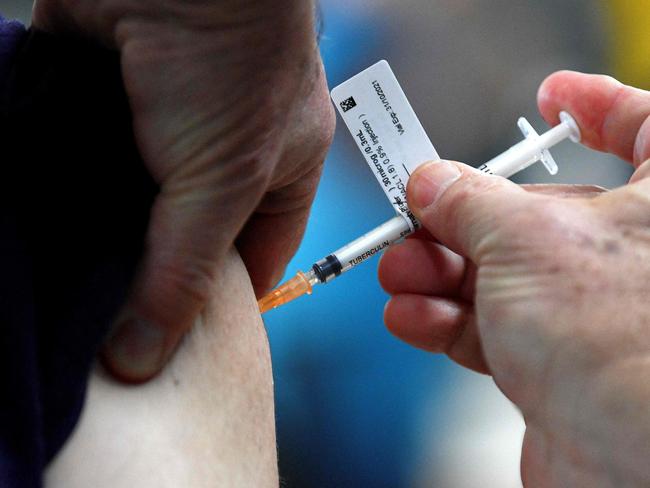
“To ensure the best protection against Covid-19 it is crucial that everyone gets their second dose in the recommended time frames. While the Government encourages everyone to get fully vaccinated, it is up to the individual to make an appointment which works for them.”
Despite concerns for the 226,706 people who are overdue for their second dose, the Department of Health said the majority of Australians had done the right thing and received their second jab on time. “The overwhelming majority of people, some 17,069,077 million Australians who are eligible to receive a COVID-19 vaccine (82.8 per cent), have already received a second dose,” the spokeswoman said.
“Those who fall outside of the recommended second dose window and have not received a second dose vaccination make up less than 0.6 per cent of the vaccine rollout nationally.” For those who have missed their second jab appointment, it is not too late. The Department of Health encourages anyone who is overdue for their second jab to make an appointment with their nearest vaccination provider now. “We continue to urge all those who have received one dose of vaccine to make an appointment for their second dose,” the spokeswoman said.
VICTORIAN HEALTH CHIEF SLAMS ROAD MAP
Victoria’s chief health officer has slammed the government’s federal road map for living with Covid, saying it fails to address the long-term economic and mental illness effects of the pandemic.
“It is as if we could all soon heave a sigh of relief and move on,” Brett Sutton and his co-author, the Grattan Institute’s Stephen Duckett, write in the Medical Journal of Australia.
“The continuing mental health effects of disruptions to life during 2020 and 2021 are already being seen in the health system, and, as with natural disasters, they will need to be managed for years, not weeks.
The editorial piece also calls for lessons to be learnt from the “messy 2021 vaccination rollout”, and for learning processes including formal inquiries to be undertaken at local, state and national levels.
Professor Sutton and Dr Duckett added that the federal government should share the increased health costs from the pandemic.
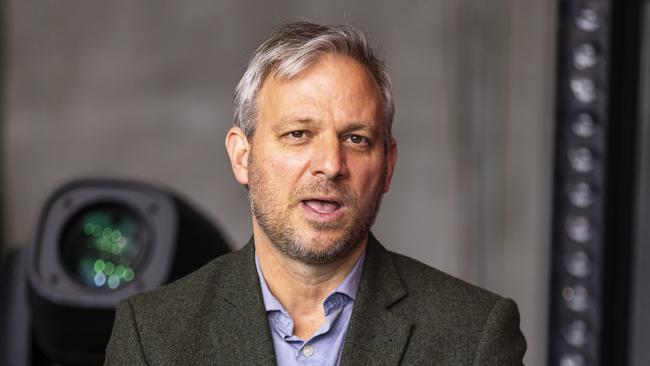
Meanwhile, Australians will be able to sail off into the sunset this Christmas under plans to reopen the country to cruise ships by the end of the year.
Health Minister Greg Hunt confirmed health officials are now reviewing the order under the Biosecurity Act preventing international cruise ships travelling to and from Australia, according to The Daily Telegraph.
Mr Hunt said the Commonwealth was working with states, territories and chief health officers to review the cruise ships rule with a view to relaxing the ban as soon as it was safe to do so.
HINT THAT WA’S BORDER WILL OPEN EARLY
Western Australia’s borders could open to the rest of the country in the first few weeks of 2022, significantly earlier than planned.
Federal health minister Greg Hunt flagged the change during a television appearance on Sunday morning.
“We’d like to see Western Australia open as soon as possible,” he told ABC’s Insiders host David Speers.
“We are hearing that they are considering bringing that forward to at least, well, coincidentally, to time with the cricket.”
WA premier Mark McGowan has previously said the state would not open its borders until it had reached a 90 per cent vaccination target, which is expected sometime in 2022.
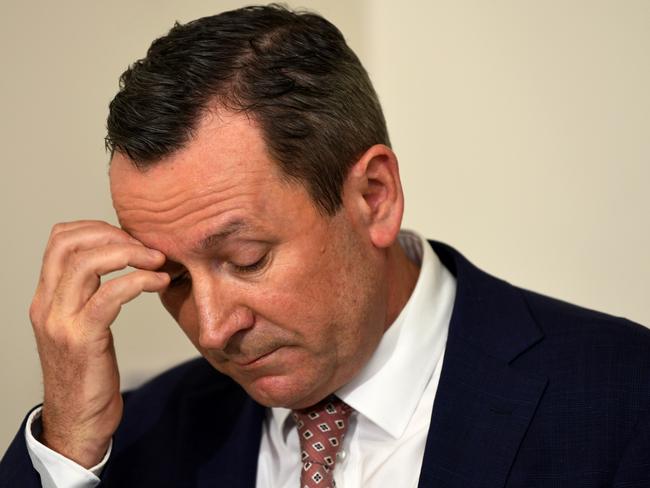
However, the fifth and final Ashes test is slated to be held in Perth from mid-January.
The government plans to allow the players to spend just five days in quarantine, so the test can go ahead as planned.
Anyone else wanting to enter the state currently has to apply for a pass and then spend 14 days in hotel quarantine, at their own expense.
Mr Hunt said while ultimately the WA government would determine when it opened its borders, he wanted to see it occur as soon as possible.
“I want to see not just cricketers, but children reuniting with parents,” he said.
“I want the same rules for children and cancer and cardiac patients, as for cricketers.”
INTERNATIONAL STUDENTS TO RETURN AMID PFIZER SIDE EFFECTS
Fully vaccinated international students entering NSW from overseas will not have to quarantine when they return to the state next month.
The first chartered plane of returning international students will touch down in Sydney International Airport on December 6.
The flight will carry about 250 students from 15 countries including Indonesia, Singapore, Vietnam, China and Canada.
A second flight transporting international students from South Asia and India is also scheduled.
NSW Premier Dominic Perrottet said the decision to scrap quarantine for fully vaccinated international students was a “significant milestone” for the state.
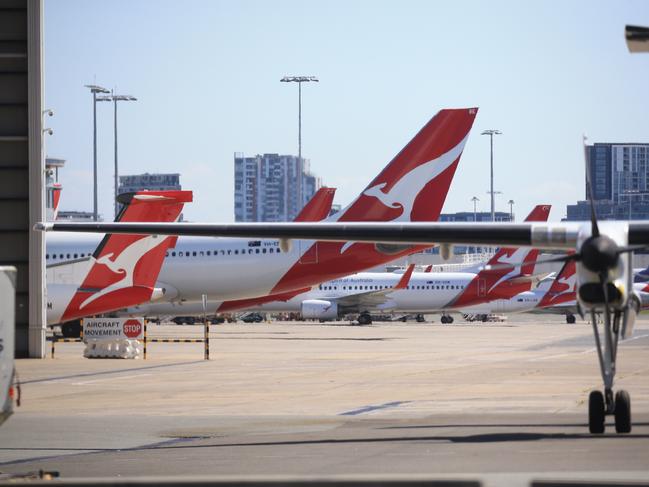
“They don’t just make a significant contribution to our economy but international students play a role in our culture and contribute to our community and lifestyle,” Mr Perrottet said.
“I can’t wait to welcome back such an important part of our community.”
It came as NSW recorded 250 new locally acquired cases of Covid-19 and no deaths on Saturday as the state’s vaccination figures continue to rise.
There were also five new infection in overseas travellers and one in an interstate arrival.
Currently, 228 people are in hospital with the virus as 32 of those are in intensive care.
More than 58,000 tests were conducted in the past 24 hours.
NSW is among the most highly-vaccinated regions in the world as there are now 90.8 per cent of its residents aged 16 and older that are fully vaccinated.
There is also 94.1 per cent of the eligible population that’s had at least one dose.
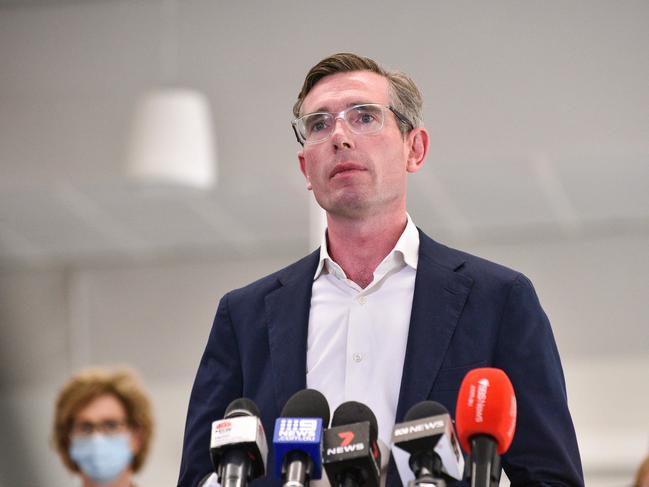
It came as Victoria recorded 1221 new locally acquired Covid-19 infections on Saturday, along with four new deaths.
There are now 405 Victorians in hospital with the virus, including 77 of those in intensive care and 51 on a ventilator.
About 86 per cent of Victorians aged older than 12 are now fully vaccinated, and around 93 per cent have received their first jab.
A 90 per cent double-dose vaccination rate was predicted to be achieved about November 24.
Yesterday Victoria recorded 1115 new cases.
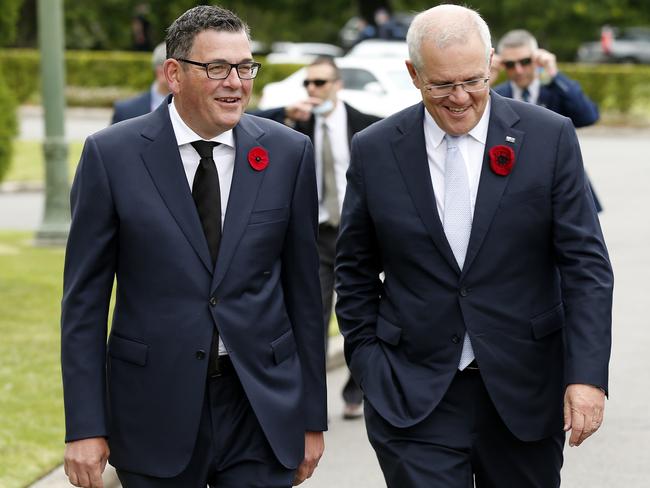
Once the state reaches 90 per cent double vaccination coverage, Premier Daniel Andrews has committed to no restrictions on the state’s population.
That target is expected to be reached on about November 24 when the Premier expects to have “no density” measures anywhere.
“Masks will only be required in high-risk indoor settings, such as public transport, prisons, hospitals, aged care, to give you some examples,” Mr Andrews said earlier in the week.
“I want to see 80,000 plus people at the Boxing (Day) Test on day one.
“It won’t be easy, but we are very confident, very, very confident that we will be able to deliver that.”
35 NEW CASES OF HEART INFLAMMATION
The number of cases of heart inflammation in Australia linked to the Pfizer vaccine has risen to 288 from about 22.7 million doses.
That’s up 35 on the previous week when the Therapeutic Goods Administration (TGA) reported 253 cases from about 21.9 million doses.
“Of the cases classified as likely to be myocarditis, most of the patients experienced symptoms within three days of vaccination. Around half of the patients were admitted to hospital with 11 being treated in intensive care. Most patients treated in hospital were discharged within four days,” the TGA says in it’s latest Covid-19 vaccine weekly safety report.
The youngest case classified as ‘likely myocarditis’ to date was 12 years old.
The TGA says “the estimated reporting rates in Australia appear similar to overseas rates.”
“As we have received limited adverse event reports for Spikevax (Moderna), our analysis of likely myocarditis cases focuses on data for the Comirnaty (Pfizer) vaccine,” the medicines regulator said.
Two new cases of blood clots linked to the AstraZeneca vaccine were also recorded, taking the total to 160 cases. The cases involved 72 and 73-year-old men from Victoria who had their second dose. Eight people have died as a result of blood clots – six of these were women.
The TGA has also received 144 reports of suspected Guillain-Barre Syndrome occurring after vaccination with AstraZeneca – a rare but sometimes serious immune disorder affecting the nerves and can result in pain, numbness, muscle weakness and difficulty walking.
Eighty-seven reports of suspected immune thrombocytopenia (ITP) were also linked to the AstraZeneca jab, a rare immune reaction when platelets, which help blood to clot, are mistakenly destroyed.
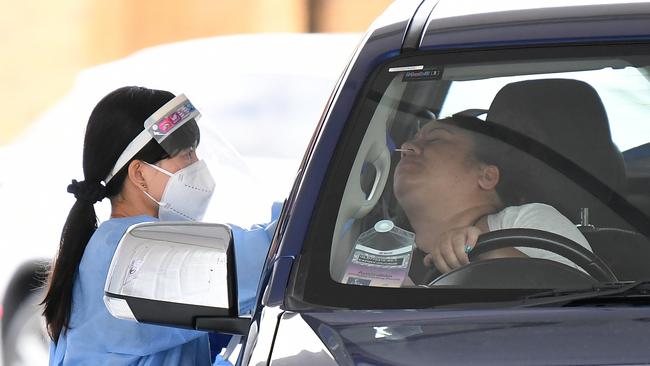
NEW VACCINE MILESTONE
Australia has hit a new vaccine milestone of more than 90 per cent of people aged 16 and over having their first Covid jab.
Scott Morrison told Melbourne radio station 3AW all states were expected to hit 80 per cent double vaccination coverage for over 16s by the end of the year.
New South Wales, Victoria and the ACT have already hit that target.
“We are going to have one of the highest vaccination rates in the world that comes with having one of the best records in saving lives,” Mr Morrison said.
NEW TRAVEL BUBBLES COMING
Australians will soon be able to travel to Japan and South Korea under new travel-bubble arrangements set to be formalised within coming weeks.
As of this week, fully vaccinated Australians are able to travel to Singapore without quarantining, provided they test negative to Covid-19 within 48 hours of departing and again after arriving.
From November 21, fully vaccinated Singaporeans will be able to fly to NSW, Victoria and the ACT without quarantining on the condition they test negative to Covid-19.
Other states are not yet accepting international arrivals except for returning Australians, who must quarantine for two weeks at a state-managed facility.
Prime Minister Scott Morrison said bubbles would soon open up to two other Asian destinations.
“Singapore opens up on the 21st of November, and I think we’ll move fairly quickly beyond that into Korea and Japan, and before the end of the year I hope we’re opening up even more,” he told the Victorian Chamber of Commerce and Industry on Wednesday.
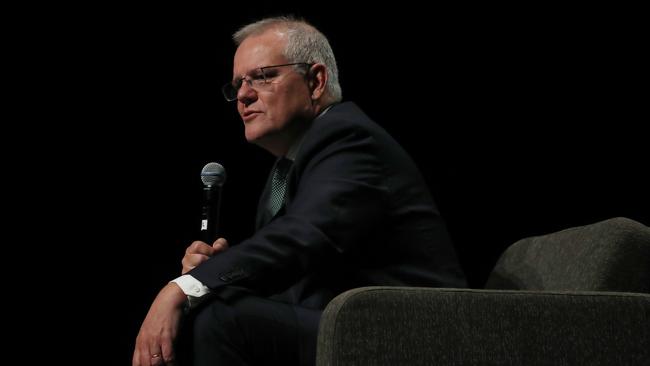
“Australians have been through a lot. They don’t want to see it get the wobbles now in terms of how we’re managing the safely reopening process.”
The abolishment of quarantine in Victoria and NSW was praised during the Prime Minister’s address on Wednesday.
“I commend both NSW and Victoria in abolishing quarantine for those coming from overseas, vaccination was a key part of the answer and that has been answered,” he said.
While travellers from outside Singapore, Korea and Japan are unlikely to be allowed into Australia until next year, Mr Morrison indicated international students and skilled workers would be allowed back into Australia, without quarantining, “as soon as possible”.
“Students will be back, I think, before the end of the year, particularly in Victoria,” he said.
Until last month, Australians who wanted to travel overseas for professional or compassionate reasons needed to apply for an exemption to leave the country.
Ellen Ransley, James Hall




